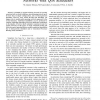Free Online Productivity Tools
i2Speak
i2Symbol
i2OCR
iTex2Img
iWeb2Print
iWeb2Shot
i2Type
iPdf2Split
iPdf2Merge
i2Bopomofo
i2Arabic
i2Style
i2Image
i2PDF
iLatex2Rtf
Sci2ools
INFOCOM
2003
IEEE
2003
IEEE
Instability Phenomena in Underloaded Packet Networks with QoS Schedulers
— Instability in packet-switching networks is normally associated with overload conditions, since queueing network models show that, in simple configurations, only overload generates instability. However, some results showing that instability can happen also in underloaded queueing networks appeared in the recent literature. Underload instabilities can be produced by complex scheduling algorithms, that bear significant resemblance to the Quality of Service (QoS) schedulers considered today for packet networks. In this paper, we study with fluid models and with adversarial queueing theory possible underload instabilities due to strict-priority schedulers and to Generalized Processor Sharing (GPS) schedulers.
Communications | INFOCOM 2003 | Queueing | Underload Instabilities | Underloaded Queueing Networks |
| Added | 04 Jul 2010 |
| Updated | 04 Jul 2010 |
| Type | Conference |
| Year | 2003 |
| Where | INFOCOM |
| Authors | Marco Ajmone Marsan, Mirko Franceschinis, Emilio Leonardi, Fabio Neri, Alessandro Tarello |
Comments (0)

